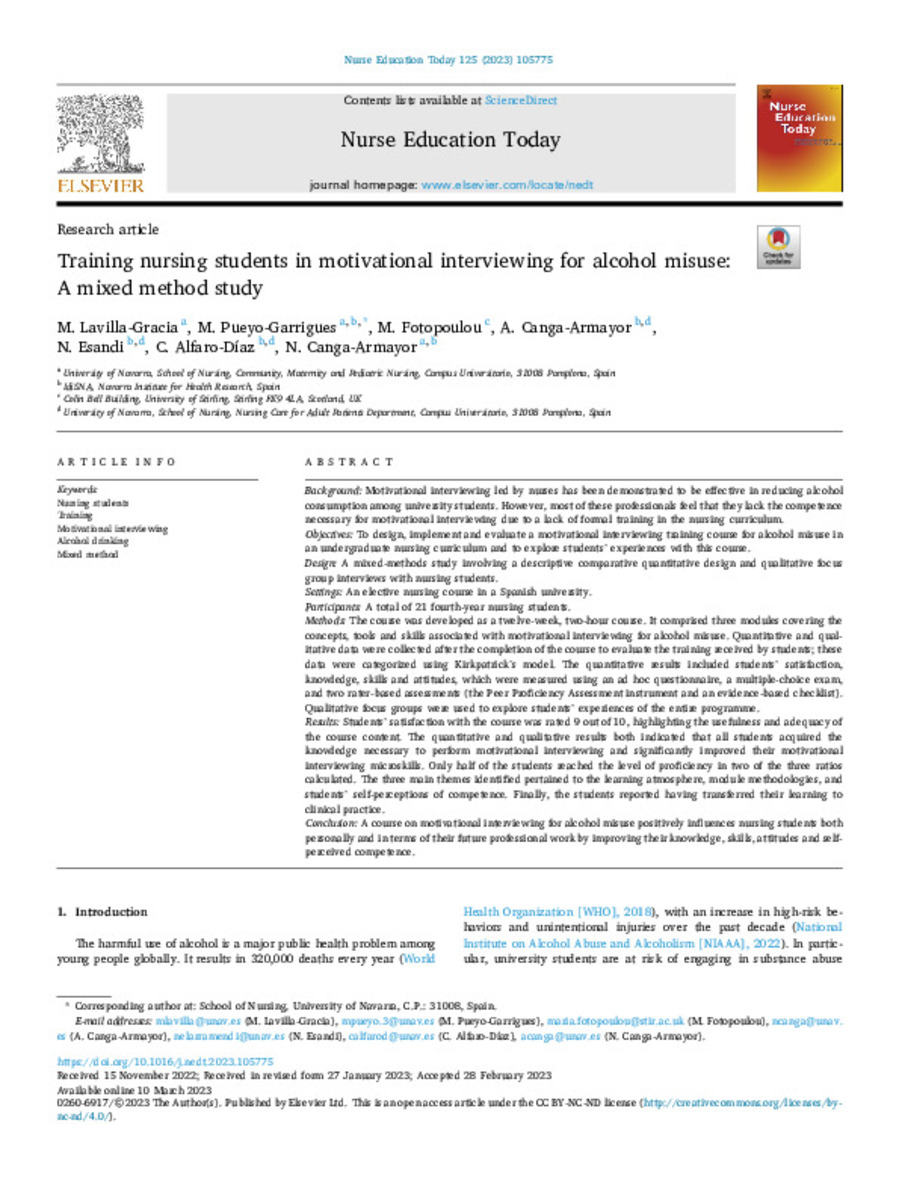Full metadata record
| DC Field | Value | Language |
|---|---|---|
| dc.creator | Lavilla-Gracia, M. (María) | - |
| dc.creator | Pueyo-Garrigues, M. (María) | - |
| dc.creator | Fotopoulou, M. (M.) | - |
| dc.creator | Canga-Armayor, A.D. (Ana Dolores) | - |
| dc.creator | Esandi, N. (Nuria) | - |
| dc.creator | Alfaro-Díaz, C. (Cristina) | - |
| dc.creator | Canga-Armayor, N. (Navidad) | - |
| dc.date.accessioned | 2023-04-14T07:37:12Z | - |
| dc.date.available | 2023-04-14T07:37:12Z | - |
| dc.date.issued | 2023 | - |
| dc.identifier.citation | Lavilla-Gracia, M. (María); Pueyo-Garrigues, M. (María); Fotopoulou, M.; et al. "Training nursing students in motivational interviewing for alcohol misuse: a mixed method study". Nurse Education Today. 125, 2023, 105775 | es |
| dc.identifier.issn | 0260-6917 | - |
| dc.identifier.uri | https://hdl.handle.net/10171/65911 | - |
| dc.description.abstract | Background: Motivational interviewing led by nurses has been demonstrated to be effective in reducing alcohol consumption among university students. However, most of these professionals feel that they lack the competence necessary for motivational interviewing due to a lack of formal training in the nursing curriculum. Objectives: To design, implement and evaluate a motivational interviewing training course for alcohol misuse in an undergraduate nursing curriculum and to explore students' experiences with this course. Design: A mixed-methods study involving a descriptive comparative quantitative design and qualitative focus group interviews with nursing students. Settings: An elective nursing course in a Spanish university. Participants: A total of 21 fourth-year nursing students. Methods: The course was developed as a twelve-week, two-hour course. It comprised three modules covering the concepts, tools and skills associated with motivational interviewing for alcohol misuse. Quantitative and qualitative data were collected after the completion of the course to evaluate the training received by students; these data were categorized using Kirkpatrick's model. The quantitative results included students' satisfaction, knowledge, skills and attitudes, which were measured using an ad hoc questionnaire, a multiple-choice exam, and two rater-based assessments (the Peer Proficiency Assessment instrument and an evidence-based checklist). Qualitative focus groups were used to explore students' experiences of the entire programme. Results: Students' satisfaction with the course was rated 9 out of 10, highlighting the usefulness and adequacy of the course content. The quantitative and qualitative results both indicated that all students acquired the knowledge necessary to perform motivational interviewing and significantly improved their motivational interviewing microskills. Only half of the students reached the level of proficiency in two of the three ratios calculated. The three main themes identified pertained to the learning atmosphere, module methodologies, and students' self-perceptions of competence. Finally, the students reported having transferred their learning to clinical practice. Conclusion: A course on motivational interviewing for alcohol misuse positively influences nursing students both personally and in terms of their future professional work by improving their knowledge, skills, attitudes and self-perceived competence. | - |
| dc.description.sponsorship | This work was supported by the Association of Friends of the University of Navarra and Banco Santander. | - |
| dc.language.iso | en | - |
| dc.rights | info:eu-repo/semantics/openAccess | - |
| dc.subject | Alcohol drinking | - |
| dc.subject | Mixed method | - |
| dc.subject | Motivational interviewing | - |
| dc.subject | Nursing students | - |
| dc.subject | Training | - |
| dc.title | Training nursing students in motivational interviewing for alcohol misuse: a mixed method study | - |
| dc.type | info:eu-repo/semantics/article | - |
| dc.description.note | This is an open access article under the CC BY-NC-ND license | - |
| dc.identifier.doi | 10.1016/j.nedt.2023.105775 | - |
| dadun.citation.publicationName | Nurse Education Today | - |
| dadun.citation.startingPage | 105775 | - |
| dadun.citation.volume | 125 | - |
Files in This Item:
Statistics and impact
Items in Dadun are protected by copyright, with all rights reserved, unless otherwise indicated.






